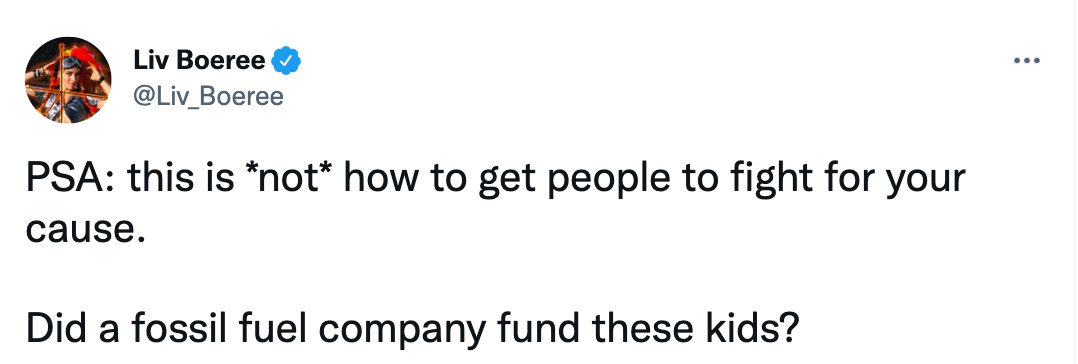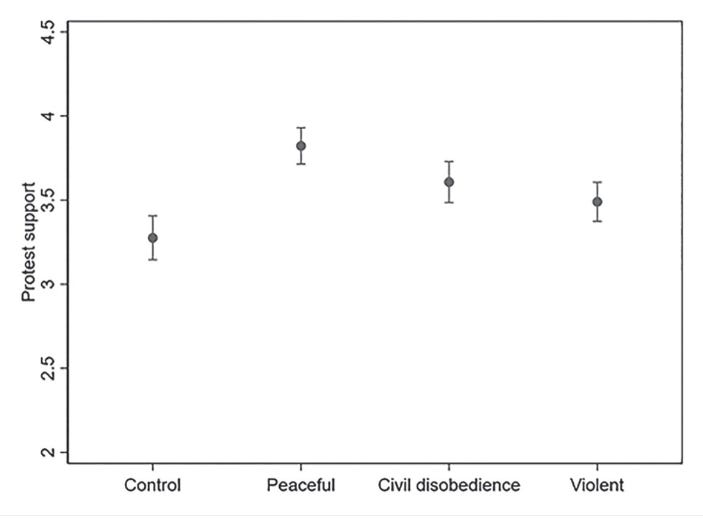What’s everyone got against throwing soup?
Let's actually look at the evidence base behind radical tactics
Unless you’re living under a rock, you’ve probably heard of Just Stop Oil throwing tomato soup (no, not Campbell’s) over Van Gogh’s Sunflowers. The video on Twitter has over 35 million views, and everyone is talking about it, whether you’re a world champion poker player, the founder of YCombinator, or the New York Times.
Interestingly, the most common take seems to be “Don’t these people know how social change works?? Disruptive protest is not the answer and this is not how you win people over!!” Even bolder are people who score this “0/10 for theory of change”.
One common denominator between these reactionary takes is that they’re often not based on empirical evidence. The claim is that these disruptive (or radical, extreme or whatever you want to call it) tactics don’t work. In fact, people not only claim these tactics are ineffective, but they also claim they’re counterproductive, and lead to a movement being weaker overall. So why don’t we examine this claim?
First of all, there is a clear strategy being used by Just Stop Oil, and other disruptive organisations – the radical flank effect. The radical flank effect is where more radical factions of a social movement can increase support for more moderate factions. For moderate groups, this can mean increased support for their goals, increased mobilisation, or additional donations. However, there is some debate about whether the radical flank effect is positive (it helps moderate groups) or negative (it harms moderate groups). To test this theory, I’ll quickly summarise some academic literature on the topic.
I’ll be drawing upon a literature review we just completed at the Social Change Lab, where we examined the academic literature relating to why some protest movements are more successful than others. Unsurprisingly, the radical flank effect is a crucial part of this question. To sum it up in one sentence, our conclusion was: A nonviolent radical flank is likely to help, not hinder, a social movement. Specifically, we think there’s good evidence it can increase support for more moderate groups and increase the salience of an issue without harming support for the overall movement’s policy goals. To back up this claim, we can look at some of the relevant literature:
Simpson et al. (2022) use an experimental approach to look at the impact of radical tactics within the climate and animal advocacy movement. The paper abstract says it all so I will just quote directly below. To reiterate, despite radical tactics, the authors find no evidence of reduced support for the overall goals of the movement (e.g. support for climate policies stays the same).
“Use of radical tactics by one flank led the more moderate faction to appear less radical, even though all characteristics of the moderate faction were held constant. This perception led participants to identify more with and, in turn, express greater support for the more moderate faction. These results suggest that activist groups that employ unpopular tactics can increase support for other groups within the same movement, pointing to a hidden way in which movement factions are complementary, despite pursuing divergent approaches to social change. [Emphasis mine]
Shuman et al. (2022) is another great paper focused not only on nonviolent radical flanks, but also non-normative and nonviolent radical flanks. To clear up some jargon, non-normative just refers to activists using unconventional tactics, such as blocking roads or sit-ins, rather than a standard legal demonstration. Again, I will just quote directly from the paper:
“Taken together, we show that nonnormative nonviolent action can be an effective tactic for generating support for concessions to the disadvantaged among those who are most resistant because it generates constructive disruption.”
This next relevant bit of evidence is our (Social Change Lab)’s public opinion polling for Just Stop Oil (disclaimer: I’m the Director of Social Change Lab and this work hasn’t been peer-reviewed yet). This seems pretty topical, as it’s real-life data from the same group, which we collected via YouGov less than 6 months ago. Long story short, despite approximately 60% of the public hearing about Just Stop Oil’s action, we found no negative effects on support for climate policies. Even though support for Just Stop Oil as an organisation went down slightly across our 3 nationally representative surveys (N=2,000 per survey), we detected no negative effects on any other outcome variable. Additionally, we found marginally significant positive effects on people’s willingness to take part in climate activism, suggesting there may have been weak positive effects that encouraged the UK public to become more interested in taking climate action (see below).
Finally, Bugden (2020) finds that relative to a control group, civil disobedience (as performed by Just Stop Oil) performs better in terms of increasing support for the movement. Yes, peaceful protest might perform better but that is the activists dilemma1 - normal peaceful protest won’t get you international media coverage and millions of people talking about you!
If you want to read about these studies in more detail or find additional studies discussing the radical flank effect, I would again refer people to our literature review. If you’re not a big fan of academic literature, why don’t we look at some other evidence?
First of all, Martin Luther King Jr. is, in many ways, seen as a civil rights hero. He was the driving force behind the Southern Christian Leadership Conference and a big player in the passing of the Civil Rights Act of 1964. So people in the 1960s must have loved him, right? Wrong. A Gallup poll from 1966 shows that 63% (!) of people had an unfavourable view of Martin Luther King Jr. Additionally, the poll supposedly oversampled Black people, so the true value of Americans who had negative views of MLK is likely even higher! Notice the disapproval rate in 2011 - a measly 4%, down almost 60 percentage points.
What does one take away from this? Probably that humans are quick to get annoyed when they encounter disruptive activists, but after periods of moral progress, they suddenly view those same pesky activists as moral heroes.
For a historic example, I present Benjamin Lay, a Quaker abolitionist from the 1700s. A true moral entrepreneur, he advocated against the use of slaves when it was deeply normalised. He was pretty radical too – during a Quaker meeting, Lay stabbed a book filled with fake blood, splattering nearby slave owners and professing “Thus shall God shed the blood of those persons who enslave their fellow creatures”. At the time, he was formally expelled from various Quaker congregations, yet now we look back upon his work as heroic. Did I mention he was vegetarian too?
A more recent example of going from one of the most hated groups in a country to being told they were offering a very practical and necessary solution, is Insulate Britain. From having extremely low levels of public support to then having opinion pieces written about them in the Times newspaper admitting they were right – that is probably one of the quicker turnarounds I’ve seen. Oh, and the UK Government also wanted to call their new insulation scheme “Insulate Britain” - funny that.
It’s not just Insulate Britain either. Respected commentator James O’Brien also admits he’s changed his views on Extinction Rebellion, no less than 3 years after they launched! Even though XR has some of the lowest public support, they seem to have caused an increase in UK climate concern, led to new environmental groups in over 1100 cities and probably significantly reduced UK carbon emissions. Despite this, a lot of the discourse in April 2019 was about how “they got their tactics wrong”. Urm, no they didn’t - they achieved more than basically any other UK-based climate movement organisation in the last decade!
Now I need to do my obligatory caveat that just because people are annoyed by a protest, it doesn’t necessarily mean it’s effective either! I’m also not saying I think throwing tomato Soup at a Van Gogh is the most effective tactic. All I’m saying is that just because you (or a lot of people) are annoyed by a protest, it doesn’t necessarily mean it’s harmful.
To conclude, I think that most people have unjustified negative reactions to disruptive protests. Despite many people claiming that disruptive or radical protests have negative impacts on a movement’s likelihood of winning, the evidence suggests the opposite is true: Nonviolent radical tactics are likely to increase support for more moderate groups, in ways that increase an overall movement’s chance of achieving their aims.
Even the most rational individuals seem to fall foul of bizarre emotional reactions when they see something non-normative (like throwing tomato soup at an artistic masterpiece). But what is progress, if not throwing soup at art?
Whilst this paper might indicate that extreme protest could have harmful effects, I think the main finding is that they could be worse than a moderate protest, rather than worse than no protest. For example, 5/6 studies have no control group, making it impossible to tell if the actions are overall negative. Additionally, because the experimental design sometimes conflates violent activities with highly disruptive but nonviolent actions, it’s also hard to tease out how much violence-inducing activities are harmful vs non-normative ones like throwing soup at a painting.








Okay... I think I see your point.
If someone has the ability to engage in an act of civil disobedience that will raise attention about climate change and sound the alarm, as it were, and if that act is relatively harmless, then we might as well go for it... because it certainly beats the alternative of doing nothing, or engaging in acts that will garner rather little attention or media coverage.
To be sure, you've certainly given us a lot to think about, and you've done a good job of highlighting points that would suggest that there was a lot more calculation and consideration behind this act than we may have first believed.
Very nicely written and explained Baran :)
Job very well done